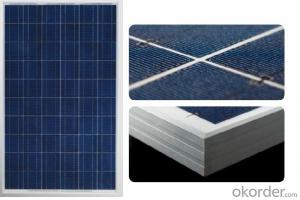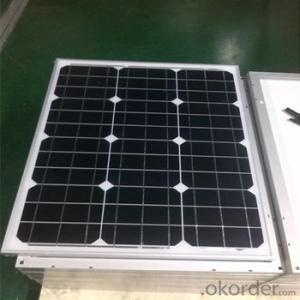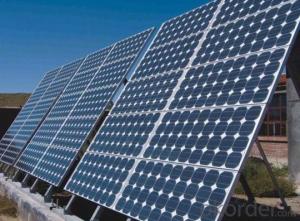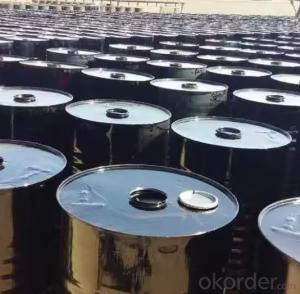Solar Modules (Poly-Crystatline solar Panel)TPB156×156-36-P
- Loading Port:
- Ningbo
- Payment Terms:
- TT OR LC
- Min Order Qty:
- 100 carton
- Supply Capability:
- 10000 carton/month
OKorder Service Pledge
OKorder Financial Service
You Might Also Like
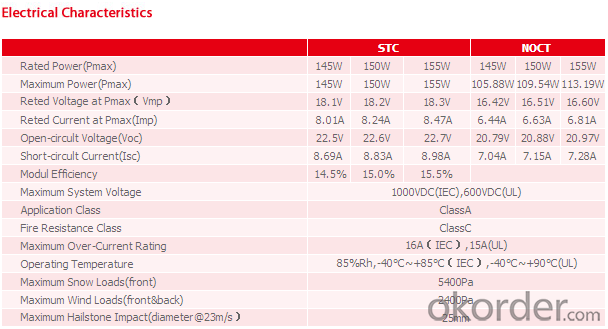
Specification:
· Highest performance enabled by higher efficiency monocrystal line cells and the latest Solar Wafer Technology for multicrystal line cells
· Lower weight design which reduces the total system load on a roof, making it ideal for residential customers. Its shape allows for better roof utilization
· Its low weight means easier handling for installers
· Modules are designed to withstand PID (Potential Induced Degradation)*
· High light transmission Anti-Reflective Glass with improved self-cleaning capability
· 0/+5 W Positive power tolerance for reliable power output
Warranty
CNBM Solar provides one of the most comprehensive module warranties in the industry:
· 10 years for product defects in materials and workmanship
· First 12 years for 90% of warranted minimum power
· Remaining 25 years for 80% of warranted minimum power
Certification
CNBM Solar strictly carries out the ISO 9001 quality control methodology and has implemented check points at every step of the production process to ensure our product performance durability and safety. The stringent quality control process has been confirmed by numerous independent agencies and LDK Solar modules earned IEC, TUV and UL certifications.
· IEC:IEC 61215, IEC 61730 (1&2), conformity to CE
· UL 1703 2002/03/15 Ed:3 Rev:2004/06/30
· ULC/ORD-C1703-01 Second Edition 2001/01/01
· UL and Canadian Standard for Safety Flat-Plate
· ISO 9001: 2008 Quality Management Systems
· CEC Listed: Modules are eligible for California Rebates
· PV Cycle: Voluntary module take back and recycling program
· MCS Certificate
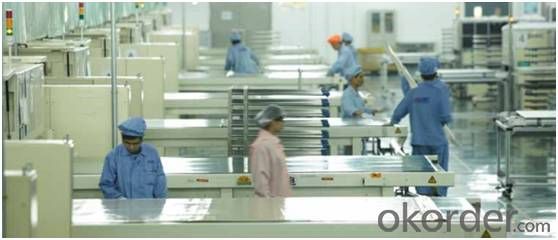
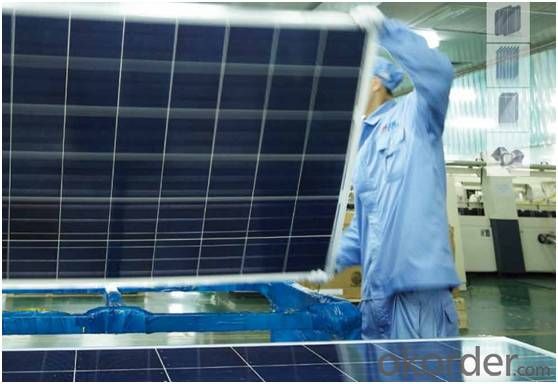
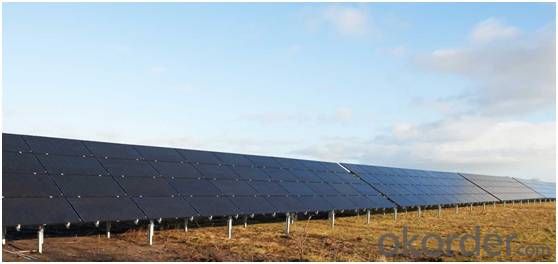
FAQ
Q: How long has Solar PV technology been around?
In 1838 the photoelectric effect was discovered by physicist Edmund Becquerel although it wasn't until the 1950's that the technology was developed enough to produce efficient working cells.
Q: Are Photovoltaic panels expensive?
Over the last 20 years the price of PV modules has fallen dramatically, from around £15 per Wpk in 1980 to current prices of around £3.50 per Wpk.
Q: Will I have to get planning permission?
Not in the vast majority of cases. However if you want your system ground mounted, if your property is part of a world heritage site, or is listed, then planning permission would likely have to be sought in advance.
Q: How long will a Solar PV system last?
The MCS accreditation scheme means that all panels installed under the scheme by approved agents will continue to generate for at least 25 years. Over this time their output will diminish slightly but they should still perform at 85% at the 25 year mark according to the scheme rules.
Q: How much Power can I expect to get from my Solar PV’s?
Typically an installed 1kWpk array will produce 800kWh/year. 2kWpk will produce 1600kWh/year and so on.
- Q:Do solar panels require regular inspections or maintenance checks?
- Yes, solar panels do require regular inspections and maintenance checks. These checks ensure that the panels are functioning optimally, identify any potential issues or damage, and allow for timely repairs or cleaning. Regular inspections and maintenance contribute to the longevity and efficiency of solar panels.
- Q:Do solar panels require a specific type of wiring or electrical setup?
- Yes, solar panels require a specific type of wiring and electrical setup. They need to be connected in series or parallel to form an array, and the wiring should be designed to handle the direct current (DC) generated by the panels. Additionally, an inverter is typically used to convert the DC electricity into alternating current (AC) for use in the electrical system of a building or to be fed back into the grid. It is important to follow electrical code requirements and consult with professionals when installing solar panels to ensure a safe and efficient setup.
- Q:I live in a higher LATITUDE so in the winter months, there is a limitation in the amount of sunlight available, but will this impediment restrict the ability of solar panels to function due to the lack of sunlight involved?
- Solar panels generate power only during sunshine hours. But they only need sunshine, they don't like the heat, that comes along with the sunshine. So its a trade off, the places that have a lot of sun, also have a lot of heat, and places that do not have a lot of sun are not that hot. But you do need sunlight to run solar panels. There's a lot of tools available which can tell you how much power you are able to generate given your location.
- Q:Well, I am looking for a cheap way on building a solar panel, instead of buying by the manufacturing stores. I would like to stay in the budget up to ,000 dollars. I want to have Solar Energy for my house because the sun is always shining. Is there a way I can make the Light power some of my house? What would I need? How much time would it take?Where can I get the items I need?
- The panels themselves- no. Minimal. For most it is just hosing them off with water as needed to remove dust. Battereis on the other hand are usually needing attention every week to maintain the electrolyte levels. The exception being AGM types. Periodic desulphating may be needed on older setups, but beyond that keeping chickens are more demanding. Batteries are how you store your energy for periods when demand exceeds what the panels can deliver, and at night. How many varies. Factors of how you use energy has most impact. Some people can get by with a few hundred Watts, for others 3 to 5 Kilowatts are needed. For the average American, 5 to 7 Kilowatts as a minimum without some serious changes to how energy is used.
- Q:hey, Im going into my senior year at high school and after that will be moving to Pennsylvania where my family has a house on ten acres and I will be going to college there and living all year around. My father wants to build a huge barn for our cars and other stuff like tools, I mentioned too him what about solar panels on the roof to power maybe the house and barn. Would this be a good Idea? Where would be the best place to look into getting solar panels be? Thanks for anyones help!
- This is a site that can help you estimate the size and number of panels that will power what you intend to provide for. There are plenty of sites selling the panels, so compare prices. Also, check whether your state is offering the rebate like the state of CA is and what the restrictions, terms and conditions are. Even with the rebates they are very costly, so be certain to calculate the pay off period for your application to see whether it is a cost efficient option for your energy usage.
- Q:Can solar panels be installed on a church or religious building?
- Yes, solar panels can be installed on a church or religious building. In fact, many religious institutions are increasingly adopting solar energy as a sustainable and environmentally-friendly solution. Installing solar panels on a church or religious building can help reduce energy costs, lower carbon footprint, and demonstrate a commitment to green practices.
- Q:I'm doing a project for school and I'm a little confused about energy and solar panels. I'm looking to propose installation of solar panels to power the computer lab at my school. From what I've read a computer and monitor use roughly 350 watts per hour. I was looking at solar panels and it says they produce various wattage. For example, I was looking at one rated at 200 watts. Does that mean 200 watts in a day? Or per hour? Please help.
- The rating of a solar panel is a maximum continuous rating. A 200 Watt panel will give a maximum of 200 watts under ideal conditions. A computer and monitor use about 400 Watts. not per hour - watts is Volts * Amps and a measure of Power. In hour a computer and monitor uses 400 Watt hours (Wh). Wh is a measure of Energy. To power a lab of 0 computers you will need 0* 400 = 4000 Watts. To run this from solar panels through the day only you would need a 4000 Watt panel. Except - its cloudy, the sun is in the wrong place - many factors reduce the output. To be reasonably safe you would need about a 2000 Watt panel. Then you would need batteries to store power through dull periods AND a voltage converter to change from low voltage DC from the solar panels to the mains voltage for your computers.
- Q:Can solar panels be used for irrigation systems?
- Yes, solar panels can be used to power irrigation systems. Solar energy can be harnessed by the panels and converted into electricity, which can then be used to run pumps and other components of an irrigation system. This renewable energy source offers a sustainable and cost-effective solution for powering irrigation systems, especially in remote or off-grid areas.
- Q:When I make a solar panel, what do I use to store the energy. For example I am going to make a solar panel to power my lights in my room. But I dont want the lights only to come on when the sun is out because that would be very pointless. So... Do I use the panels to charge something like a car battery and then run wires from the battery to an extension chord which will go to a surge protector? It sounds awesome, but I have to put it all together. The help is very appreciated. Thank you guys.
- Did okorder . This might definitely help you!
- Q:I have made a 5v dc 52watt solar panel and I going to be trying to charger 4 2v dc 55ah batteries. I get about 6 hours of sun on my panel. Spec below, is that a big enough panel to charge the batteries???I have 30 3x6 solar cells wired together Cell Specifications: (Watts): .75 Wp (Amps): 3.5 Imax (Volts): 0.5 V max which is where I got my 5g 52watt max (if math is wrong plz tell me) The Battery type: 2Volt 55.0ah NB Sealed Lead Acid Battery. I am using a mppt solar charger.
- Technically, any solar panel can charge any battery, but it would take quite a long time do do so if it is a large battery. If you are aware of the voltage and either amp or watt rating of the unit that is usually used to charge the battery, the solar panel should have a similar power output to that charger to work well. amps and watts are quite similar, and can be converted with this simple formula: W=watts; V=volts; A=amps; W/V=A; V*A=W; When charging batteries, it is always wise to use less amps than needed, and roughly the same voltage as the battery being charged. The less amps used to charge batteries means the battery will take longer to charge but will last a lot longer in the long-term. Your solar panel should be sufficient to charge the battery, but you should test charge it to see if it works well. I recommend using a multimeter to check the batteries voltage every couple of hours. Once the battery reaches 2v, it should be fully charged. You should also check the amps in case they are not at the expected value (take caution when checking amps with a multimeter, when i do it i always end up melting my multimeter leads). The battery should be fully charged from anywhere between 6-48 hours. if it is charging faster, the solar panel has too much power. if it doesn't charge in this time frame, the solar panel is not powerful enough.
1. Manufacturer Overview |
|
|---|---|
| Location | |
| Year Established | |
| Annual Output Value | |
| Main Markets | |
| Company Certifications | |
2. Manufacturer Certificates |
|
|---|---|
| a) Certification Name | |
| Range | |
| Reference | |
| Validity Period | |
3. Manufacturer Capability |
|
|---|---|
| a)Trade Capacity | |
| Nearest Port | |
| Export Percentage | |
| No.of Employees in Trade Department | |
| Language Spoken: | |
| b)Factory Information | |
| Factory Size: | |
| No. of Production Lines | |
| Contract Manufacturing | |
| Product Price Range | |
Send your message to us
Solar Modules (Poly-Crystatline solar Panel)TPB156×156-36-P
- Loading Port:
- Ningbo
- Payment Terms:
- TT OR LC
- Min Order Qty:
- 100 carton
- Supply Capability:
- 10000 carton/month
OKorder Service Pledge
OKorder Financial Service
Similar products
New products
Hot products
Hot Searches
Related keywords
